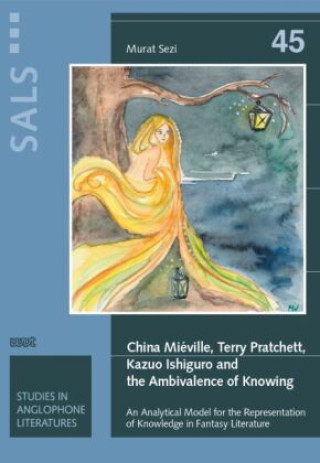
Kód: 41408193
China Miéville, Terry Pratchett, Kazuo Ishiguro and the Ambivalence of Knowing
Autor Murat Sezi
The guiding question of this study is how the theme of knowledge is realized in the genre of fantasy. Drawing from the research fields of literature and knowledge, theory of fantasy, narratology, and memory/orality studies, China ... celý popis
- Jazyk:
 Angličtina
Angličtina - Vazba: Brožovaná
- Počet stran: 180
Nakladatelství: WVT Wissenschaftlicher Verlag Trier, 2022
- Více informací o knize

800 Kč

Skladem u dodavatele v malém množství
Odesíláme za 3-5 dnů
Potřebujete více kusů?Máte-li zájem o více kusů, prověřte, prosím, nejprve dostupnost titulu na naši zákaznické podpoře.
Přidat mezi přání
Mohlo by se vám také líbit
-

Dune
200 Kč -

Haunting Adeline
617 Kč -

Berserk Deluxe Volume 2
1050 Kč -

White Nights
90 Kč -

Powerless
276 Kč -

Atomic Habits
340 Kč -

Dune Messiah
178 Kč -

Berserk Deluxe Volume 3
1138 Kč -

One Day
276 Kč -

Berserk Deluxe Volume 1
1033 Kč -

Iron Flame
353 Kč -

Surrounded by Idiots
256 Kč -

Harry Potter and the Prisoner of Azkaban (Minalima Edition)
673 Kč -

Gravity Falls Journal 3
440 Kč -

Heaven Official's Blessing: Tian Guan Ci Fu (Novel) Vol. 1
426 Kč -

The Creative Act
586 Kč -

Dune
214 Kč -

Hunting Adeline
633 Kč -

A Little Life
276 Kč -

Children of Dune
174 Kč -

Heaven Official's Blessing: Tian Guan Ci Fu (Novel) Vol. 2
441 Kč
Dárkový poukaz: Radost zaručena
- Darujte poukaz v libovolné hodnotě a my se postaráme o zbytek.
- Poukaz se vztahuje na celou naši nabídku.
- Elektronický poukaz vytisknete z e-mailu a můžete ihned darovat.
- Platnost poukazu je 12 měsíců od data vystavení.
Více informací o knize China Miéville, Terry Pratchett, Kazuo Ishiguro and the Ambivalence of Knowing
Nákupem získáte 80 bodů
 Anotace knihy
Anotace knihy
The guiding question of this study is how the theme of knowledge is realized in the genre of fantasy. Drawing from the research fields of literature and knowledge, theory of fantasy, narratology, and memory/orality studies, China Miéville, Terry Pratchett, Kazuo Ishiguro and the Ambivalence of Knowing: An Analytical Model for the Representation of Knowledge in Fantasy Literature furthermore investigates how societal struggles over knowledge are negotiated in contemporary fantasy literature, with specific foci on the depiction of technology and risk in China Miéville's The Scar, culture and identity in Terry Pratchett's Nation, and memory and repression in Kazuo Ishiguro's The Buried Giant.The study finds that while the worldviews the novels espouse with regard to their attitude to knowledge differ considerably, they all contain the general notion that knowledge can be dangerous, in that the discovery or revelation of hitherto secret knowledge threatens the stability of the society itself or the personhood of individuals. Knowledge conflicts are staged by means of contrasting worldviews, which are realized through the novels' character systems. This particularly pertains to the questions of whether it is better to remember or to forget, and whether the old or the new society is to be preferred. TABLE OF CONTENTS1. Introduction .................................................................................................. 92. Literature and knowledge ............................................................................ 132.1 Preliminary considerations ............................................................................. 142.2 Ways of conceptualizing the relationship between literature and knowledge 152.3 Knowledge as a theme of fantasy literature .................................................... 193. Fantasy and genre ........................................................................................ 233.1 Defining fantasy ............................................................................................. 243.2 Fantasy and structuralism ............................................................................... 263.2.1 Fantasy as mode, genre, and formula .................................................. 293.2.2 Fantasy, structuralism, and character knowledge ................................ 303.3 Rhetorics of fantasy ........................................................................................ 323.3.1 The narrative trajectory of the portal-quest fantasy ............................... 333.4 Conclusion: Theorizing fantasy ...................................................................... 354. Narratology ................................................................................................... 374.1 Character ........................................................................................................ 374.1.1 Character knowledge ........................................................................... 394.2 Plot ................................................................................................................. 434.2.1 Story, plot, and fantasy ........................................................................ 444.3 Space .............................................................................................................. 454.3.1 The division of narrative space ............................................................ 484.4 Conclusion: Narratology ................................................................................ 495. The literary realization of individual and collective knowledge ............... 515.1 Memory in literature ....................................................................................... 525.1.1 Collective memory: Communicative and cultural memory ................. 535.1.2 The rhetoric of collective memory ................................................
 Parametry knihy
Parametry knihy
Zařazení knihy Knihy v angličtině Literature & literary studies Literature: history & criticism Literary studies: fiction, novelists & prose writers
800 Kč
- Plný název: China Miéville, Terry Pratchett, Kazuo Ishiguro and the Ambivalence of Knowing
- Podnázev: An Analytical Model for the Representation of Knowledge in Fantasy Literature
- Autor: Murat Sezi
- Jazyk:
 Angličtina
Angličtina - Vazba: Brožovaná
- Počet stran: 180
- EAN: 9783868219616
- ID: 41408193
- Nakladatelství: WVT Wissenschaftlicher Verlag Trier
- Hmotnost: 298 g
- Rozměry: 10 × 149 × 211 mm
- Datum vydání: 13. September 2022
Osobní odběr Praha, Brno a 12903 dalších
Copyright ©2008-24 nejlevnejsi-knihy.cz Všechna práva vyhrazenaSoukromíCookies


 Vrácení do měsíce
Vrácení do měsíce 571 999 099 (8-15.30h)
571 999 099 (8-15.30h)